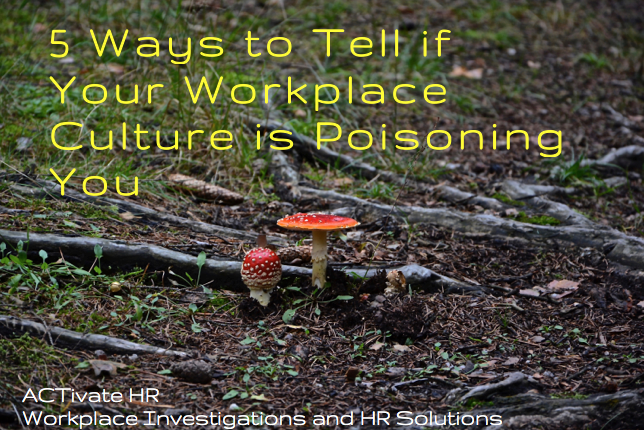Are you being poisoned by a toxic workplace culture? Today, we’re going to share five ways to tell, as well as what you can do to improve it.
Research has shown that up to 80% of our behaviour is dictated by our environment.
Most people balk at this. But think about it – how different are your actions and the language you use when you are at work versus when you are interacting with small children, at an outing with your family or coaching your child’s hockey team?
I’ll wager that your behavior is different even in extremes of one environment.
Say at work when dealing with operational crews in a plant environment versus presenting to the Board of Directors. While we may not all relate to those specific examples, the premise holds true:
Your environment shapes you.
We all have a core of values and beliefs.
With some exceptions, these tend to hold true across environments. That doesn’t mean that we won’t act differently depending on the situation we are in.
For those who don’t have strongly held beliefs, their reactions in different environments will vary a lot.
Our human need to fit in and belong is so strong that we act in ways that fit the cultural norms of the environment, are approved of by those in groups, and tend to make us successful.
What happens if you’re part of a toxic workplace culture?
The short answer is, as you are a human being, your behaviour will change.
The trouble is, it happens unconsciously and insidiously.
You may not notice it until someone points it out or until you get ill because your actions don’t align with your beliefs.
So, how can you tell if the toxic work environment you are in has made YOU toxic as well?
5 Signs of a Toxic Workplace Culture
Take a good, honest look at yourself to see if you’ve started doing any of these things:
1. Focusing on what’s wrong
There are positives and negatives in any situation. Do you spend your time focusing on the negative instead of looking for solutions? Have you started relishing in other’s failures rather than rooting for collective success?
2. Passing the Buck
Toxic environments don’t tend to have a high threshold for mistakes as a process of learning. As a result, people often stop taking accountability and start finger-pointing or playing the victim.
3. Talking About People, Not to People
The amount of gossip increases with toxic workplace culture and environments.
It goes hand in hand with ‘passing the buck’…it is easier to blame others when things go wrong if you have managed to sully their reputation. It’s also easier to blame someone if they are unaware and unable to defend themselves.
Unchecked employee issues (including gossip!) can be the death of the workplace! Click here for peaceful resolutions to employee issues.
4. Losing Trust
If the number of people you trust, and who trust you, has gone down, ask yourself why.
Most often those who don’t trust others can’t be trusted.
When faced with decreased trust in the environment, other toxic behaviour becomes present. Holding a grudge, needing to be right, having the last word or the loudest voice in a conversation can all be fear-based responses in the absence of trust.
Want to find out if you’re a trusted leader or a tyrant leader? Click here.
5. Not Helping Others
Do you succeed by only looking out for yourself? If a team member needs help, do you put up your hand to help or do you find something else you need to do? Worst case, do you withhold help or information from others?
If you find that you’ve started any of the above, it’s time to reflect on what impact your work environment is having on you.
The longer you stay in a toxic environment, the more ingrained the behaviour will become.
Likely, some of these actions are affecting how you are in other environments as they aren’t in alignment with your beliefs and values; either by spilling over, manifesting as illness, or by causing you to be stressed and less patient.
Are your corporate values destroying trust? Find out here.
When it’s time to get out of a toxic workplace culture
Don’t let a toxic workplace change you for the worse or impact your relationships or health. Sadly, in many cases, the culture is set at the top and your best option is to leave and find an organization that is a better fit for you.
If a workplace culture can’t be changed, it might be time to find an entirely new one.
If you are a leader in an organization and want help changing a toxic workplace culture into a positive one, give us a call or send a note to info@activatehr.ca…and don’t forget to follow us on LinkedIn.
Did you learn a lot from this post on signs of a toxic workplace culture? Here are three more to check out:
What is in Your Respectful Workplace Policy?
Effective Communication Techniques to Bring Your Workplace Harassment Policy to Life
Effectively Investigating Workplace Bullying and Harassment Hazards and Incidents
This article was originally published in 2017, but has been updated in 2020 just for you!

